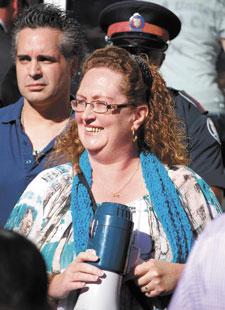Empty beer gardens, flagging donations and sponsors who delayed signing contracts caused an estimated $250,000 deficit for Pride Toronto (PT), says executive director Tracey Sandilands.
Final numbers for 2010 will not be ready until September, says Sandilands, but she suggests beverage sales might have been down by as much as $60,000.
In 2009, PT lost $138,605, even as it grew its budget from $2 million to $3 million.
“We can’t keep posting deficits,” Sandilands says. “We have to reestablish our financial base. The only way to do that is to take what we are certain of for next year — which is very little at this stage — and make sure that our budgets fit into that. So, severe cuts in every respect.”
As a result, Sandilands announced on July 14 that two PT staff members are being laid off: entertainment manager Mary Zondanos and communications manager Michael Ain. A third position will not be filled when a staffer returns to school in September, and five short-term contracts will not be renewed when they expire on July 30.
The number of stages and beer gardens in 2011 could also be affected, Sandilands adds.
“Next year looks very bleak at this point,” she says.
Financial figures will not be available until PT’s annual general meeting on Sept 23, but Sandilands chalks up the deficit to companies who had not signed expected contracts even shortly before Pride Week.
“Many of those sponsors, up until two weeks before the festival, we were still expecting their sponsorship. They had given verbal confirmations, they had agreements ready to sign,” says Sandilands.
She says sponsors eventually balked because of the censorship battle. In March, PT announced that it would vet all parade signs in advance through an “ethics committee.” In May, it announced a ban on the term “Israeli apartheid.” In both cases, community revolt forced PT to retract its policy.
PT’s official guide for 2010 lists some 34 major sponsors, compared to 27 in 2009.
Former board member Mark Smith, a member of the Pride Coalition for Free Speech, says logistical problems were apparent to Pride Week attendees. They show “lazy, inefficient programming,” which led to losses at both the beer tents and in the toonie drive.
“It has zero to do with the political messaging issue,” says Smith.
The scorching, mostly empty South Stage and the long lines at Queen’s Park on Saturday night, where people queued to watch Cyndi Lauper, are examples of poor planning that did little to foster good will toward PT, he says.
In addition to belt-tightening, PT is also looking to turn the corner on community concerns about its decisions over the last year.
In June, it pledged to hold broad consultations with Toronto’s queers. That process is being shepherded by 519 Church Street Community Centre executive director Maura Lawless, gay lawyer Doug Elliott and Metropolitan Community Church of Toronto pastor Brent Hawkes.
A panel will be charged with gathering input and generating a set of recommendations.
“Pride is pulling together a bunch of issues that they would like some direction on,” says Hawkes.
“Obviously, some of those issues are directly before us now,” he adds, giving as examples the inclusion of Queers Against Israeli Apartheid and the increasing corporatization of Pride.
Meanwhile, Hawkes says that he, Elliott and Lawless have generated a list of people they would like to sit on the panel and sent the list to PT. From the pool the board approves, people will be approached to create a diverse, seven-member panel. Both Hawkes and Elliott have offered to sit on the panel.
“The initial conversations have to do some open public forum formats, but also some targeted formats to go to some organizations and groups to get their feedback. So it’s not just the louder voices who are really engaged in some of these issues,” says Hawkes.
Hawkes wants the process to be as public as possible, with the mandate, meetings and recommendations all shared widely.
That’s encouraging to Roy Mitchell, a member of the Pride Coalition for Free Speech.
“It must be a committee made up of the diversity of the community and people that will honour the history of Pride and understand that this is an opportunity to change Pride in a way that better reflects the history of Pride and the current conditions in which queer and trans people live,” he says.
But, Mitchell points out that when it comes to transparency, having Hawkes and Elliott submit a “secret list nominating themselves,” doesn’t make for a good start.
Sandilands, for her part, says she is skeptical of big, public meetings where community members air their grievances. She cites the April 13 Blockorama meeting, as an example.
“We found that when we tried to speak, we were shouted down,” she says. “That’s not productive.”
Because of a combination of vacations and the scope of its task, the public consultation panel won’t have results in time for the AGM, Hawkes says.
“There’s no way. If we’re really serious about listening to the community and listening to different segments of the community, it’s not going to be possible,” says Hawkes.
“It’s going to be the first of September before the panel kicks off. And the hope is — at least my hope is, if I’m involved — that September, October, November will be intense times to listen and then to make recommendations.”
Elliott and Lawless are on vacation as Xtra goes to press, and neither could be reached for comment.


 Why you can trust Xtra
Why you can trust Xtra


